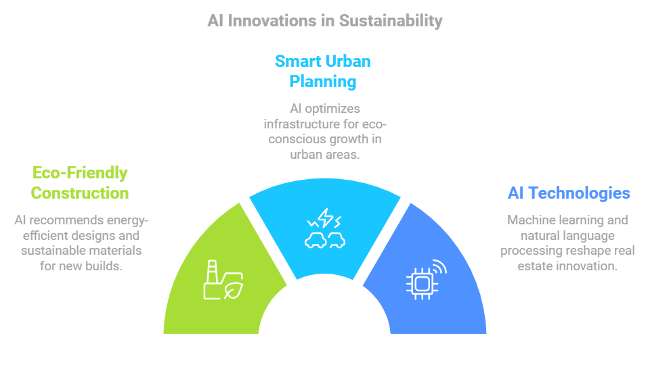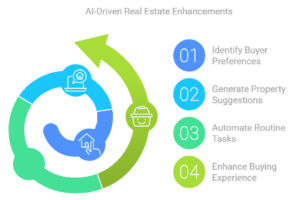Artificial Intelligence (AI) is transforming industries globally, and Arizona’s real estate market is no exception. By integrating AI technologies, real estate professionals are enhancing efficiency, improving experiences, and making informed decisions.
The global AI market in real estate was valued at $351.9 million in 2022 and is projected to reach $1,047 million by 2032, growing at a CAGR of 11.52%. Thought leaders at AllAboutAI.com highlight how this actionable intelligence helps professionals address challenges and seize opportunities.
The Rise of AI in Real Estate
Arizona’s real estate sector is experiencing significant growth due to urban expansion and a competitive housing market. AI technologies are pivotal in this transformation.
| AI Applications in Real Estate | Impact |
| Predictive Analytics | Forecasts property values and trends, enabling data-driven investment strategies. |
| Personalized Search | Machine learning tailors property recommendations to buyer preferences. |
| Virtual Reality (VR) | Offers immersive property tours, expanding reach to out-of-state buyers. |
| AI-Powered Operations | Enhances property management processes and decision-making capabilities. |
Organizations embed AI into operations to optimize management. For instance, Cushman & Wakefield transform commercial processes using AI.
AI and Sustainability in Real Estate
In Arizona, sustainability is becoming a key focus. AI innovations support eco-friendly efforts.
Eco-Friendly Construction AI analyzes climate and environmental data to recommend energy-efficient designs and sustainable materials for new builds. These data-driven insights are especially valuable in regions like Arizona, where sustainable building practices are crucial for managing extreme weather conditions.

Smart Urban Planning AI contributes to urban planning by optimizing infrastructure for eco-conscious growth. Cities like Phoenix are leveraging AI to integrate renewable energy solutions, manage traffic flow efficiently, and implement waste reduction systems, making urban areas more livable and environmentally friendly.
To better understand its transformative impact on real estate, it’s essential to define how artificial intelligence operates today. AI encompasses machine learning and natural language processing are key tools reshaping real estate innovation.
Benefits for Buyers and Sellers
The implementation of AI in Arizona’s real estate market offers numerous advantages:

For Buyers:
- Personalized Experiences: AI-driven platforms provide customized property suggestions based on individual preferences and behaviors.
- Efficient Processes: Automation of routine tasks, such as scheduling viewings and answering queries, enhances the overall buying experience.

For Sellers:
- Targeted Marketing: AI analyzes market data to identify potential buyers, enabling more effective and targeted marketing campaigns.
- Optimized Pricing: Predictive analytics assist in setting competitive prices, ensuring properties are neither undervalued nor overpriced.
AI in Property Management
Property management in Arizona is also benefiting from AI innovations:
- Tenant Screening AI systems assess tenant applications by evaluating credit scores, rental histories, and other relevant data, ensuring reliable tenant selection.
- Predictive Maintenance AI monitors property conditions and predicts maintenance needs, allowing for proactive repairs and reducing long-term costs.
- Energy Management AI-powered smart systems optimize energy usage, promoting sustainability and reducing utility expenses for property owners and tenants.
Challenges and Considerations
While AI offers substantial benefits, there are challenges to address:
- Data Privacy The use of AI involves handling vast amounts of personal data, raising concerns about privacy and security. Ensuring compliance with data protection regulations is crucial.
- Algorithmic Bias AI systems can unintentionally perpetuate biases present in their training data, leading to unfair practices. Continuous monitoring and updating of algorithms are necessary to maintain fairness.
- Adoption Barriers Smaller real estate firms may face difficulties in adopting AI technologies due to costs and lack of expertise. Providing accessible solutions and training can help bridge this gap.
Conclusion
The integration of AI in Arizona’s real estate market is poised to grow, offering innovative solutions that enhance efficiency and customer satisfaction. 90% of companies expect AI to transform leasing processes by 2029, indicating a significant shift towards automation and data-driven decision-making in the industry.
Embracing AI technologies will enable real estate professionals in Arizona to stay competitive, adapt to market changes, and meet evolving customer expectations. The future of real estate in the state is set to be increasingly dynamic, efficient, and customer-centric, driven by the continuous advancements in artificial intelligence.




